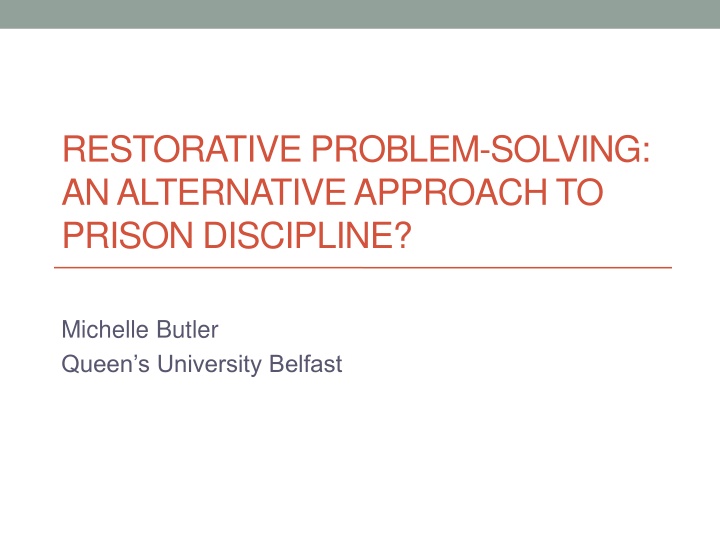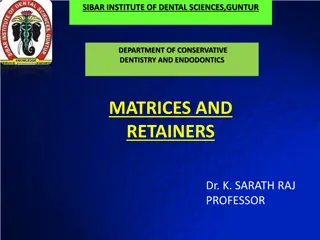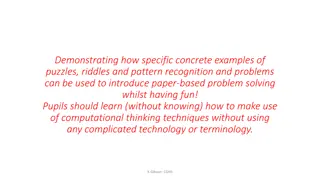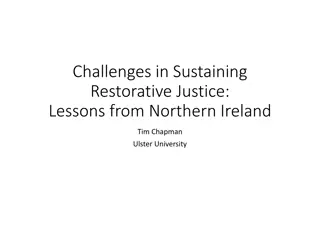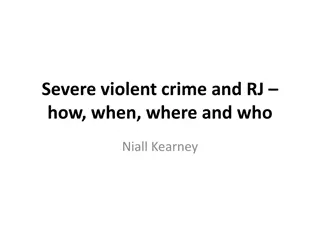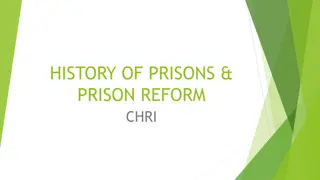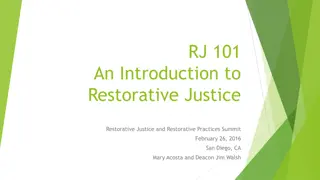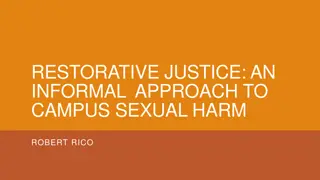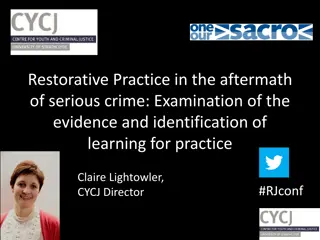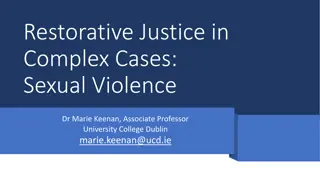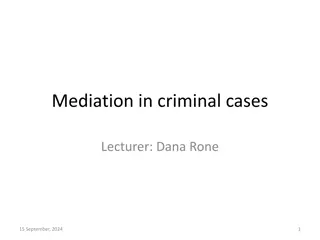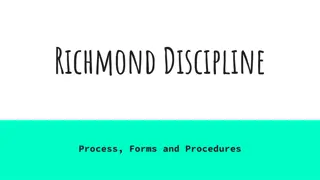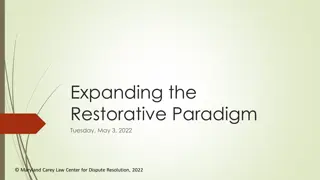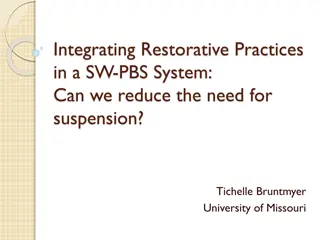Restorative Problem-Solving: An Alternative Approach to Prison Discipline
Research by Michelle Butler from Queen's University Belfast explores the impact of restorative problem-solving as an alternative to traditional prison disciplinary processes in the UK. The study delves into the perceived fairness of adjudications, concerns about solitary confinement for mentally ill inmates, and the relationship between compliance on incentive schemes and reduced reoffending. The methodology includes interviews with prisoners and staff, as well as observations of adjudication hearings.
Download Presentation

Please find below an Image/Link to download the presentation.
The content on the website is provided AS IS for your information and personal use only. It may not be sold, licensed, or shared on other websites without obtaining consent from the author.If you encounter any issues during the download, it is possible that the publisher has removed the file from their server.
You are allowed to download the files provided on this website for personal or commercial use, subject to the condition that they are used lawfully. All files are the property of their respective owners.
The content on the website is provided AS IS for your information and personal use only. It may not be sold, licensed, or shared on other websites without obtaining consent from the author.
E N D
Presentation Transcript
RESTORATIVE PROBLEM-SOLVING: AN ALTERNATIVE APPROACH TO PRISON DISCIPLINE? Michelle Butler Queen s University Belfast
Prison Discipline Prison disciplinary processes in the UK include: Adjudication process Accused prisoner appears before an adjudication governor in a hearing where both sides argue their case in an audio-recorded hearing and punishment is awarded according to strict guidelines (HM Prison Service, 2005). Incentives schemes (e.g. IEP, PREPS) Encourage pro-social behaviour and compliance by rewarding good behaviour and discouraging inappropriate behaviour through the withdrawal of incentives (NIPS, 2006, HM Prison Service, 2011). Three levels: Basic Standard Enhanced
Prison Discipline Research indicates that: Perceived fairness of adjudications depends on ability to hear prisoners voices (see Justice, 1983; Ditchfield & Duncan, 1987; Light & Mattlieght, 1988). Concern about the use of solitary confinement, especially for those with mental health issues (Scraton & Moore, 2004Smith, 2006;). Not a straightforward relationship between behavioural compliance on incentive schemes and reduced reoffending, mainly negatively impact on perceptions of fairness and legitimacy, inadequate rewards/punishments, open to discretion and influenced by staff- prisoner relationships (see Sykes, 1956; Liebling, Muir, Rose & Bottoms, 1999; Liebling & Price, 2001; Liebling, 2008; Ministry of Justice, 2008; Crewe, 2009). Little known about the impact of these disciplinary processes on prisoner compliance and/or defiance.
Compliance/Defiance Four methods of achieving compliance (see Scott, 2001; Bottoms, 2002, Carrabine, 2005; Crewe, 2009): Coercion Manipulation/inducement Habit, ritual or fatalistic resignation Normative justification or commitment Defiance theory (see Sherman, 1993,1995) argues that defiant reactions are more likely to occur when: Process was procedurally unjust, stigmatising and/or disrespectful Failure to identify with those imposing the sanction Previous experiences of authority Individual characteristic and deterability
Methodology Research aims: Explore staff and prisoner views about the prison disciplinary system and its impact on prisoner compliance and/or defiance. Methodology: Review of available statistical data 34 semi-structured interviews with prisoners consisting of two matched samples drawn from across four UK prisons: High punishment group (N=19, including 2 women and 7 ethnic minority. Mean number of adjudications was 23.37). Comparison group (N=15, including 2 women and 5 ethnic minority. Mean number of adjudications was 0.13). 14 semi-structured interviews with key staff and numerous informal discussions during the fieldwork Observations of adjudication hearings
Findings Adjudications: Overuse of adjudication process There is a remarkable culture here [ ] where everything goes to adjudication. It could be for the stupidest, most petty thing, but everything goes to adjudication. And, I have tried to [ ] tell them, it doesn t have to be like this. [ ] Use some wit, some interpersonal skill. (Staff) Not listened to/intimidating I said listen to me and it s like talking to a brick wall and it s like me saying See that jumper, it s white and it s a white jumper and you re saying, No, it s black. [ ] See how frustrating it would be after a while! [ ] You re wrong, we re right, [ ] that is the way it goes. (Int. 28 - Comparison) Kangaroo court It s a kangaroo court. There s no fairness, no equality to that. They read out the statements and that s it really. [ ] You can talk all morning, but there s no question, you re guilty. All prisoners have no faith in the adjudication system whatsoever. (Int. 17 - High)
Findings Incentive scheme: Illegitimate and unjust I don t they should do that [incentive scheme]. [ ] Everyone should be treated the same and punished by the board [adjudication process] (Int. 23 - Comparison) They try to control the prisoner with it [ ] they use it for their own means not as a way Well, you ve done something wrong, you deserve this adverse report , see they use it as Well, I can control you, I give you two adverse you go standard, another two and then you go basic . (Int. 24 - High) Open to misuse/discrimination Basic, Standard and Enhanced: [ ] It s a scapegoat to decide to discriminate. It s a legal way of discrimination. (Int. 18 high) A certain few [staff], very, very, few can be a bit over zealous with it. [ ] When you are going through the files you can see the same name (of staff member) popping up time and time again and that can lead you to go and look into it. Sometimes I will decide not to reduce their regime level. (Staff)
Findings Incentive scheme: Inappropriate incentives and sanctions There needs to be a bigger incentive. We are so limited by what we can offer [ ] So the big failing [ ] is the prisoners themselves don t see a big enough gap between Standard and Enhanced. (Staff) If you re on Basic regime you re not entitled to a TV. So we have actually some guys at the minute who are coaching each other: I know how to get a TV. If you self-harm [ ] whether you re on Basic or not, they ll give you a TV . (Staff) Double punishment They ve got you over a barrel, you get punished twice. [ ] They drop you from your enhancement to a standard regime. [ ] It s unfair to prisoners [ ] we re like pawns on a chess table. (Int. 21 Control) I would say [incentive scheme] and adjudications yes, I would agree with the young fella s point of view that yes [ ] that s two bites of the cherry. (Staff)
Findings Most prisoners perceived these processes as illegitimate and/or procedurally unjust, yet not all reacted with defiance. Appeared to be the combination of events which trigger defiance: Perceptions of illegitimacy an procedural unjustness Corrosive communication styles: There s certain [staff] who speak to you like you re an animal. [ ] They think because they have the uniform on they re invincible. It s not the case. Instead of just coming up and not wanting to fight with you but pushing you nearly as if they want you to bite. (Int. 19 - Comparison) Individual characteristics (e.g. drug use, mental health issues, cognitive skills, masculinity, socialisation) Some people will take it, others won t. I won t stand for it. (Int. 17 - High)
Findings Those who complied did so for reasons of fatalistic resignation and/or manipulation/inducement. No [I don t think it is a good system], but you re forced to sign it [ ] you have to take part in it [ ] You ve no option, there s no option. (Int. 21 Comparison) Resulted in short-term compliance and depended on the ability of the prison to effectively monitor and respond to prisoner behaviour. Does not encourage internalisation of norms, long-term compliance and is unlikely to promote a reduction in reoffending behaviour.
Conclusion Amend incentive schemes and adjudication process to take account of the issues identified. Consider adopting a restorative problem-solving approach to try to: Improve legitimacy and procedural justice of these processes Tackle stereotypes held by both prisoners and staff Attempt to facilitate right relationships Promote more active engagement with these processes Encourage the internalisation of rules and norms Facilitate long-term compliance and desistance Recognise impact of behaviour on others
Conclusion Here, it is break a rule, you get punished. And, the result is that you end up spending a lot of time with cases like this [minor case of disobeying an order]. Really minor, unimportant stuff. And, it impacts the staff member s authority on the landing too. The prisoner gets the idea that this guy can t work this out on his own. The only tool in his box is to say, Right, you re charged . So, there isn t a relationship there. There isn t that interpersonal leverage. I mean, think about these two [the officer and the prisoner from the case], how are they going to be like when they get back on the landing. There won t be any trust there. They ve just spent 15 minutes down-talking each other in front of the rest of us. How are you supposed to do rehabilitation in a situation like that? You can t. (Staff)
